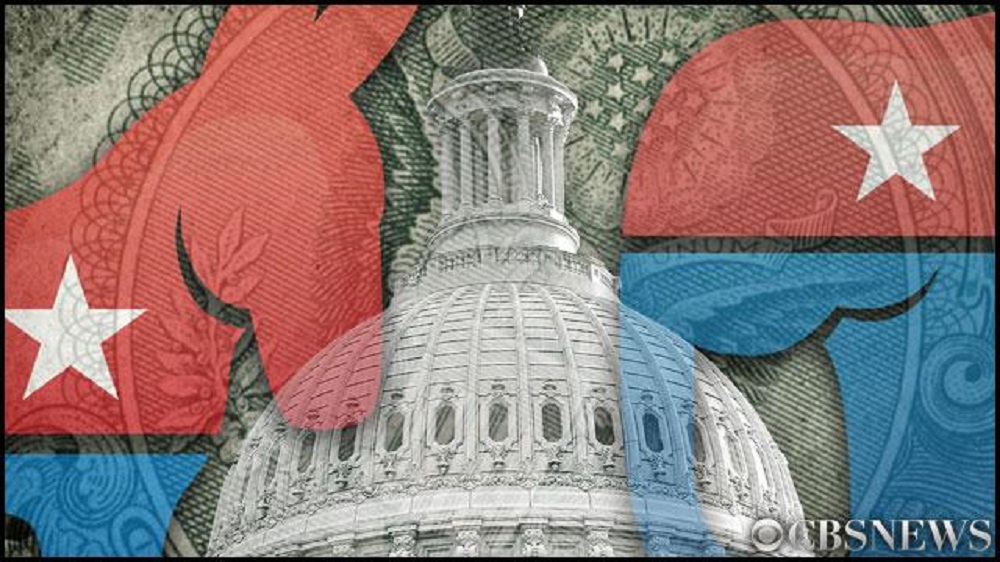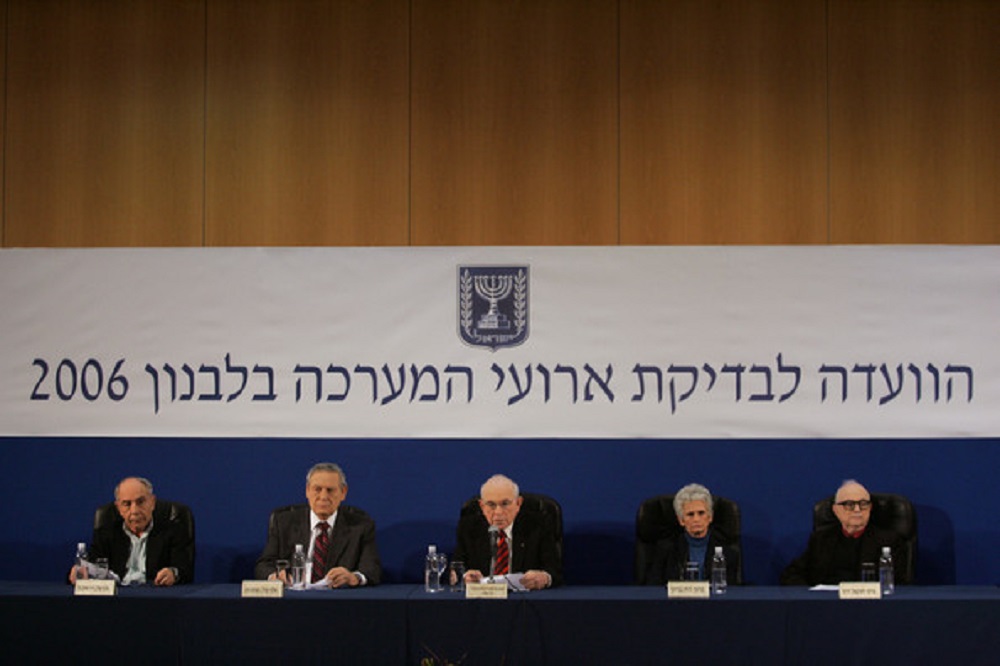A House Divided
America is once again a House divided. This time, it is between two schools of thought. The first argues that because we face a violent, existential threat to our way of life, we must become less tolerant to pressures from the radical Islamic lobby domestically and more aggressive against our enemies internationally. This group believes that we are confronted by an enemy that is committed to the destruction of our way of life, that is planning further attacks on American soil – attacks far more devastating than 9/11; an enemy that operates according to no rules, wears no uniform, carries no rank, displays no weapons, openly targets civilians, commits mass murder in the name of religion, has no qualms about turning passenger planes into cruise missiles, and would have no problem in sending anthrax through our mails; pouring botulism into our water supplies; or detonating ‘dirty bombs’ filled with radioactive waste in our cities.
This segment of our population believes that we cannot hope to stop such attacks 100% of the time unless and until we aggressively address those who commit or support them – specifically Iran, Syria, Pakistan and even Saudi Arabia. It also believes that the security of our nation during time of war requires the expansion of our surveillance apparatus, some restrictions on our right to privacy, and some infringement on our civil liberties. Socially, it believes that no religion in this country (most notably Islam) is entitled to preferential treatment under any circumstances.
The second school of thought, however, does not believe that we are at war and is prepared to make some degree of accommodation with the Islamists in return for a lesser degree of violence thereby restoring a level of stability in our everyday lives and reducing the likelihood of further government encroachments on our civil liberties. This section of society argues that a small percentage of those who hate us will, from time to time, act violently towards us. This, they acknowledge is unavoidable. However, while the group is prepared to accept that some of this violence might be justified (due to American policies in the Arab world or failings within American society itself), it cannot condone the excessive violence of the perpetrators. Rather, the goal is to reduce the degree of violence to a more acceptable level by modifying our values and policies toward the Arab/Muslim world.
The problem is – there is no middle ground between these two perceptions. Either we are at war or we are not at war. If we’re at war, we’re in a military conflict that will end with our victory or our defeat. However, if we’re in an era of unacceptable violence stemming from our values and our policies, then we are faced with a difficult, but manageable political problem that can be resolved short of war.
Unfortunately, the Bush administration has sent mixed signals on the issue. Rather than immediately seeking a Congressional declaration of war, re-instituting the draft and redirecting the American economy onto a war footing after 9/11 (as FDR did in the immediate aftermath of Pearl Harbor), the Administration did none of this, choosing instead to increase non-military public spending and supporting the consumer boom in this country as if no war existed.
While his speeches and actions immediately following 9/11 suggest that he is committed to the former school of thought, it seems to me that a war president would have engineered the demise of the Iranian mullahs after overthrowing the Taliban in Afghanistan and then sent 500,000 troops into Iraq not only to remove Saddam Hussein, but to stabilize that country. And a president at war would have long since disposed of the murderous Alawite regime in Syria and helped the Israelis wipe out Hezbollah and Hamas once and for all.
But the most important element missing in the aftermath of 9/11 was the failure of the Bush administration to capitalize on the need for national sacrifice in support of the war effort. Nations at war, especially those that are democratic in character, must be supported by the people on whose behalf they fight. That support must be expressed by a national acceptance of the need for collective sacrifice – both in human and economic terms. Everyone, from the mom-and-pop store owner on the corner to the soldier on the battlefield must be prepared to accept some degree of sacrifice in return for the promise of victory. Problem is, no collective sacrifice on the part of the American people has been required in this war leading many to suspect (incorrectly) that the President does not truly believe we are at war. In fact, for most Americans, it’s been business as usual. The ?war on terror? has not affected our daily lives as happened during the Second World War.
Harold Wilson (a former prime minister of Britain) once famously remarked – “A week is a long time in politics.” And when another prime minister, Harold Macmillan, was asked by a young journalist after a long dinner what can most easily steer a government off course, he answered “Events, dear boy. Events.” In short, should bin Laden or Iran?s Ahmedinejad or any of their terrorist surrogates carry through on their “promise” to strike at America’s major cities and deal a “crushing blow” to the “Great Satan”, public fury will demand that our current attempts to accommodate our enemies be shelved and that the ?total war doctrine? of FDR, Patton, Marshall and before them Lincoln, Grant, Sherman and Sheridan be re-instituted. The public mood will not only be furious but ugly and not merely against the terrorists, but against the countries that support, train, indoctrinate and shelter them. ?Support the ACLU? posters would disappear faster than lightening.
In the absence of such a horrific attack (or series of attacks) on American soil, however, the U.S. will settle into a more accommodating role with the Islamic world and our own indigenous Islamic community. Saudi/Wahhabi-funded organizations like C.A.I.R. (Council on American Islamic Relations) will gradually succeed in intimidating and bullying anti-Islamist organizations into cancelling speakers who oppose their Islamist agenda in the US. Saudi/Wahhabi influence in our military and penitentiary systems will continue to increase unnoticed as will their Title VI educational intrusions into our K-12 classes*, our campus Middle East Studies Departments, and through their Muslim Students’ Organization chapters on our campuses – not to mention the growth of their American-based Islamic ?charities? and their American Institutes for Arab and Islamic Studies (madrasses).
Media campaigns (such as those that appeared recently in the Washington Post and Newsweek concerning Muzzamil Siddiqi (the extremist imam of the Islamic Society of Orange County), Muhammad Hussein Fadlallah (the spiritual leader of Hezbollah) and Tariq Ramadan (a Muslim Brotherhood spokesman) will continue to show a “human face” to Salafi Islam, as will the frequency of hate crime prosecutions for offending Muslim sensitivities.
Under the rubric of ‘promoting tolerance and understanding’, the courts will eventually find a way to reconcile the separation of church and state so as to allow Muslim prayer in public places. ‘No Pork’ aisles will begin sprouting up in American supermarkets out of deference to Muslim sensitivities. Muslim Post Office employees will gradually be permitted to stop work for Friday prayers. Muslim civil servants will no longer be expected to work a full day during Ramadan. Public schools across the country will begin canceling Christmas and Halloween celebrations. School lunch menus will begin excluding items containing pork or gelatin (like Jell-O) which is often made with tissue or bones of pigs or other animals – so as to accommodate Muslim students. The Holocaust will begin disappearing from school history books on the grounds that the ?fact? of the Holocaust is offensive to those members of the Muslim community who have been weaned on the belief that it was ‘the hoax of the 20th century.’ Pro-Israel perspectives in the media will become less frequent. Federal agencies like the FBI and the Justice Department will begin using indigenous Muslim organizations like the Islamic Society of North America (which has links with the extremist Muslim Brotherhood organization) for “cultural training and Muslim outreach” courses. Universities will begin sponsoring seminars to discuss how to protect free speech while avoiding words or actions offensive to Muslims. Broadway plays will begin censoring portions deemed offensive to Muslims and art museums will begin removing pieces of art from exhibits that offend Muslim sensitivities. “Pig-centered” children’s classics like Winnie the Pooh, The Three Little Pigs, Charlotte’s Web, Babe – The Sheep-Pig, Cars and Trucks and Things That Go, Olivia Saves the Circus and Animal Farm will begin disappearing from school libraries as being “anti-Muslim.” Certain American banks may begin to ban the time-honored symbol of savings – “piggy banks” – as offensive to some Muslims (OK, perhaps that’s a stretch, but believe it or not, it?s happening today in Britain).
Gradually, rising Muslim influence in American society can be expected to have an impact on people’s everyday lives – all in the name of furthering multiculturalism and religious tolerance. For people like CAIR spokesman Ibrahim Hooper who in a 1993 interview with the Minneapolis Star Tribune said he’d “like the government of the United States to be Islamic sometime in the future….through education”, it will be a dream come true.
Internationally, U.S. foreign policy in the Arab Middle East will move further away from actively promoting democratic change to the previous policy of realpolitik – the policy based on accommodating dictators and despots that should have been discredited in the post 9/11 era. Huge arms packages, over time, will be approved by Congress and provided to ?moderate? Arab states like Saudi Arabia, Egypt and the Arab Emirates despite the instability of these regimes, despite the lessons learned in Gaza (and about to be learned on the West Bank) and despite the vulnerability of these regimes to an Islamic coup d?etat ? not to mention the fact that the majority of foreign terrorists in Iraq killing Americans today are of Saudi origin.
Israel’s qualitative military edge will gradually be dissipated despite all the rhetoric to the contrary. Israel will become more of a strategic liability than a strategic asset in the Arab Middle East (the central theme of the recent Walt-Mearsheimer book “The Israel Lobby and American Foreign Policy”) as the U.S. increasingly moves to “build bridges of understanding” within its own indigenous Muslim community and within the Arab world as a counterweight to rising radical Iranian Shi’ism and out of fear for another major attack on American soil?..and the mainstream media will insure that American attitudes towards occasional acts of Islamic terrorism overseas will be met with the same degree of concern we express when we observe tragedies like Hurricane Katrina or the South Asian tsunami on our TVs?? unfortunate for those affected, but life goes on.
However, if we are subjected to a series of deadly terrorist attacks killing hundreds of thousands of Americans on our soil and if the trail of death, destruction and economic chaos is traced back to Iran, Syria, Pakistan and/or Saudi Arabia, it would be clear to most Americans that the doctrine of accommodation has not worked, and that we are really and truly engaged in an existential struggle for our way of life – not just a problem solvable by pursuing a better strategy.
In the event of a mega-terror attack on U.S. soil, we can expect that the government – whether Democratic or Republican ? will ask Congress for a declaration of war and it will, in all probability, get it. The draft will be re-instituted and the nation (reluctantly) will support it for patriotic reasons as it did in World War II. This support will enable the government to place the national economy on a war footing. Rationing will become the order of the day in support of the war effort and ordinary Americans will be called upon to sacrifice in their everyday lives. The debate as to whether the perpetrators of these mega-attacks were criminals or enemy combatants will be at an end, and the government will be given increased powers to counter any further disasters on the home front. Guantanamo Bay will be busier than a one-armed coat hanger and America will shift from an accommodating nation to an aggressive one.
A devastating terrorist attack on American soil would likely eliminate any other alternative to war. And if and when this nation is ever forced into such a war, I have no doubt that it will do whatever is necessary to win it. We have done it before and we are more than capable of doing it again so long as we are united in purpose and committed to sacrifice. The government has an obligation to defend its citizens in time of war and will do so, but unlike the current war in Iraq, the President will carry the American people with him.
*Stanley Kurtz, “Saudi in the Classroom: A fundamental front in the war,” National Review Online, July 25, 2007



